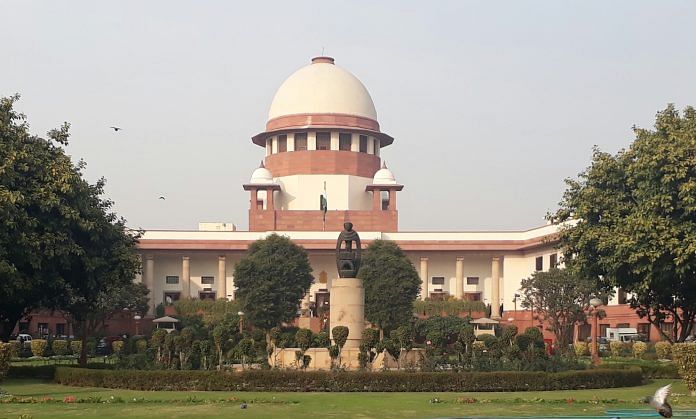Coming months will also see the last leg of CJI Dipak Misra’s career, replete with controversies, as he retires on 2 October.
New Delhi: The update of the National Register of Citizens for Assam, the Centre-Delhi government power tussle, Article 370 and the Babri Masjid hearing are among the key cases that the Supreme Court will take up when it reopens after the summer vacation Monday.
The coming months will also see the last leg of Chief Justice of India Dipak Misra’s career, replete with controversies, as he retires on 2 October.
Apart from CJI Misra, three other judges — Justice A.K Goel (6 July), Kurian Joseph (29 November) and Madan Lokur (30 December) will also retire this year.
A quick glance at the cases that will be heard by the top court in the coming days:
The NRC hearing: A bench comprising justices Ranjan Gogoi and Rohinton Nariman will hear the case pertaining to the much-anticipated final draft of the updated National Register of Citizens (NRC) for Assam, which missed its 30 June release date. The Centre sought for more time on the grounds that floods in Assam hampered the work there. The Supreme Court-monitored update of the NRC is aimed at weeding out illegal immigrants from the voters’ list.
Articles 370: Cases pertaining to Articles 370 and 35A of the Constitution are also likely to be heard in the coming weeks. The apex court had in April observed that Article 370, which grants special status to Jammu and Kashmir, was essentially a permanent statute, not a temporary one. However, the matter is still pending, since the Centre has yet to take a stand on this issue. In May, the top court deferred all pleas on the issue of article 35A that grants residents of the Valley special privileges, after the Centre and J&K sought for additional time.
Centre-Delhi power tussle: The power tussle between the Delhi government and lieutenant governor of the city will also be decided by the top court once it reopens. In December 2017, a five-judge constitution bench reserved its order on a plea filed by the Aam Aadmi Party-led government challenging a Delhi high court order, which ruled that essentially the LG was the boss of Delhi.
Babri Masjid case: A special bench led by CJI Misra will hear this case, whose verdict will have huge political implications for 2019 elections. The BJP has already suggested that the move by the Congress to initiate impeachment proceedings against CJI Misra was merely a political ploy to scuttle the Ayodhya matter.
Manipur fake encounters: Justices Madan Lokur and U.U. Lalit will be hearing the case. Last July, the top court had directed the CBI to constitute a special investigation team (SIT) to look into the encounter killings in Manipur, allegedly at the behest of the local police and the Army. The plea submitted that around 1,528 encounters took place in the past few decades.
Aadhaar case: CJI Misra will have to pronounce the verdict in the case where the constitutional validity of Aadhaar has been challenged. As of now, there are many schemes and services offered by the state where Aadhaar is a must.
In addition to these, the apex court will hear cases such the Rohingya refugee issue and Kathua rape case in Himachal Pradesh in the coming days.
Justices Lokur and Lalit will conduct an in-camera hearing of the feasibility of prohibiting the circulation of videos on child pornography and sexual assault online.
The court will also hear the environmental issue related to the ban of pet coke and furnace oil besides a green matter pertaining to the Vaishno Devi shrine in Jammu.




These issues of majoritarian will are pertinent with every religion and community. It would be wrong to blame one community for it. It is the wrong elements present in society which through such means try to dismantle the peaceful co-existence among common public.
Secondly, the special status to Kashmir is a previleged offered to Kashmir, which has out-lived it’s utility and it should now be done away with. It has halted the progress of Kashmir and allowed it to be a land of conflict and violence. If we do away with the special provisions it would allow a better integration of our country. It shall help Kashmiri youth to realise their potential and get into fruitful and peaceful life rather than mislead by some religious and regional propaganda of some with vested interest
Pakistan itself can’t sustain its economy, how can it be able to make Kashmir prosperous. The present state of Kashmir is the impact of being mislead by Pakistan and others who believe Kashmir is not part of India. It was, is and will remain pet of India. It is in interest of all.
Article 370 was the reason and condition for the Kashmiris though majority being Muslim to agree (thru their sold out leader Sh. Abdullah) to join the Indian Union. It wasn’t a bonus or gift to the Kashmiris by the GoI.
Much like the current generation of upper caste Hindus think that the reservations for the SC/ST are a favor to them. On the contrary they are a favor to the upper caste Hindus, because they stopped the SC/ST from declaring themselves as non-Hindus, which would have certainly put the remaining Hindus in a minority. Probably that’s what Ambedkar should have stuck for till the end and not give into the blackmail by the Mahatama’s threat of fast. India would not have been seeing the fascism, the fanaticism, and the rabid jingoism, and the rapes, the mass killings, and the riots, all seemingly with sanction of the state.
Y justice is taking so much time in taking decisions on ban on petcoke . People are unable to breathe pan india and they r thinking?